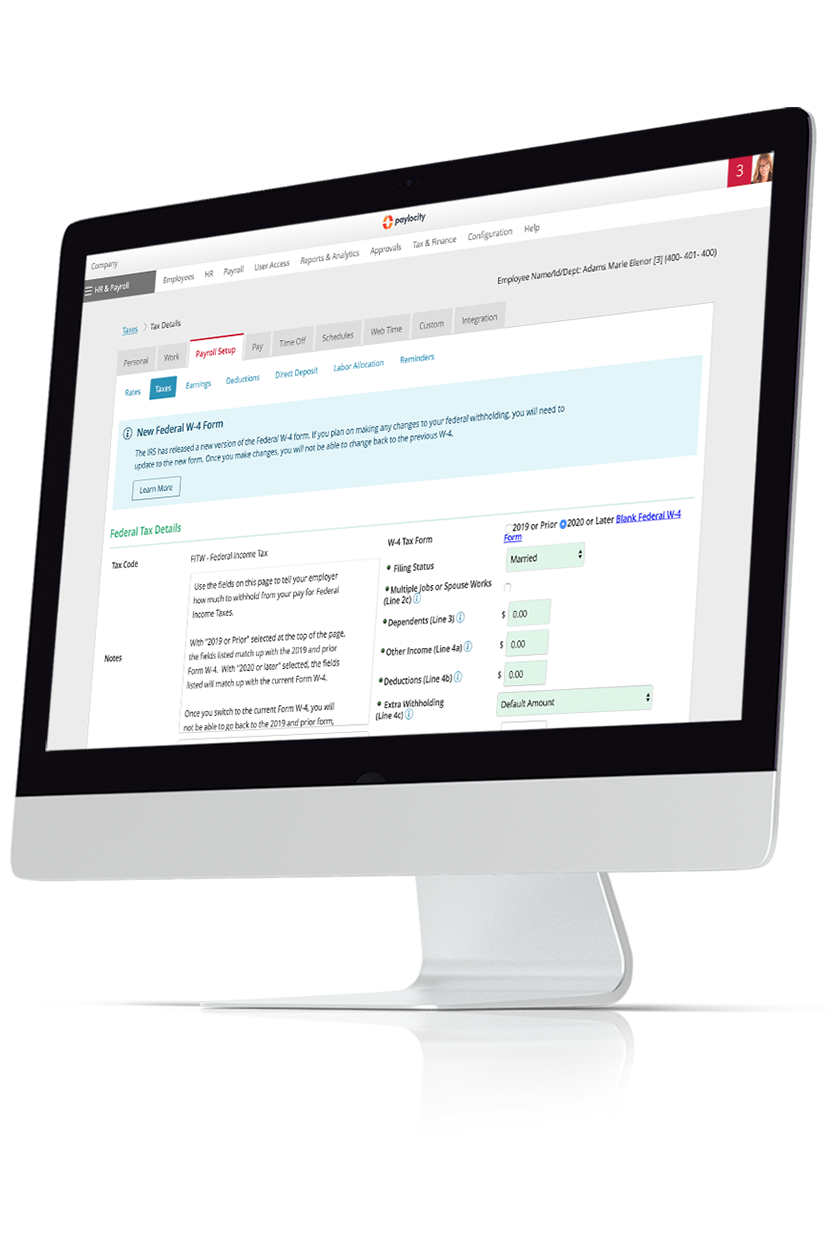Colorado Wage and Payroll Tax Facts
February 02, 2024
Having to comply with unique state taxes and wage laws can make processing payroll doubly daunting. Here’s everything you need to know about these rates and laws for the state of Colorado.
Select a state or federal tax guide

Colorado uses minimum wage rates that are substantially higher than the rates required by the federal government. Case in point, the rates required by the city of Denver are over twice as high as the federally required rates. The state also has a paid sick leave program guaranteeing time off for eligible employees.
When it comes to processing payroll, Colorado-based organizations must handle the following taxes in addition to those required by the federal government:
- Personal Income (a.k.a. State Income Tax)
- State Unemployment Insurance (SUI)
- Paid Family and Medical Leave (PFML)
- Local Taxes
The below information was last updated January 30, 2024. It is not intended as legal or tax advice.
Colorado Minimum Wage Rates
|
Wage Type |
Colorado Rates |
Federal Rates |
|
Minimum Wage |
$14.42 | $7.25 |
|
Tipped Minimum Wage |
$11.40 | $2.13 |
|
Actual Tip Credit |
$3.02 | $5.12 |
Local Minimum Wage Rates
In addition to the state-wide minimum wage rates above, the cities and counties below also have unique minimum wage rates as well:
|
Wage Type |
Boulder Rates |
Denver Rates |
Edgewater Rates |
|
Minimum Wage |
$15.69 | $18.29 | $15.02 |
|
Tipped Minimum Wage |
$12.67 | $15.27 | $12.00 |
|
Actual Tip Credit |
$3.02 | $3.02 | $3.02 |
Colorado State Income Tax (SIT) Rates
Colorado has a flat income tax rate of 4.25%, meaning all residents pay the same amount regardless of their income levels.
|
Additional Colorado SIT Details |
|
|
Valid Filing Statuses |
|
|
Exemptions |
|
|
Form W-4 |
DR-0004 |
|
Reconciliation Frequency |
Annual |
Note: Per S.B. 24-228, individual income tax rates may annually decrease by 0.04% to 0.15% through 2035 depending on the state's revenue each tax year. For more information, refer to our tax alert.
Colorado State Unemployment Insurance (SUI) Rates
SUI provides unemployment benefits to eligible workers who are unemployed through no fault of their own (as determined by state law) and meet the state’s eligibility requirements.
|
Colorado SUI Tax Details |
|
|
Taxable Wage Base |
$23,800 |
|
Employee Subject to Tax |
No |
|
Rates for Experienced Employers |
0.75% - 10.39% |
|
Rates for New Employers |
1.70% |
|
Effective Period |
Calendar Year |
|
Voluntary Contributions Allowed |
Yes; must be made before March 15 |
| Support Surcharge | Varies |
Colorado State Disability Insurance (SDI) Rates
SDI benefits are funded by employees through mandatory payroll deductions from each paycheck. Colorado, however, doesn't require employers to collect an SDI tax.
Miscellaneous Colorado Tax Information
Reciprocal Agreement(s)
Reciprocal agreements are when workers who live and work in different states are only required to pay taxes to the state where they live. Colorado currently has no reciprocal agreements with any other states.
This doesn’t mean, however, that interstate workers living in Colorado pay double. It’s federally illegal for two states to tax the same income. In most cases, the employee’s work state will credit or refund them at tax time based on the taxes they owe their home state. If the tax rates differ, the employee must cover the difference.
Paid Sick Leave (PSL) Taxes
The state of Colorado doesn't require employers to collect PSL taxes, but it does have a program providing such leave to eligible employees:
|
Colorado PSL Details |
|
| Covered Employees | All employees in the state |
| Accrual Method(s) | One hour for every 30 hours worked |
| Annual Accrual Maximum | 48 hours |
| Carryover Maximum | 48 hours |
| FAQs | Healthy Families and Workplaces Act (HFWA) |
Paid Family and Medical Leave (PFML) Taxes
Like SDI, Colorado’s Family and Medical Leave Insurance (FAMLI) program is funded via mandatory payroll deductions and employer contributions.
| Colorado FAMLI Details | |
| Covered Employees | Most employees who have earned at least $2,500 in wages within the state over the period of one year. Self-employed workers may choose to opt into coverage if they both live and work in the state. |
| Covered Employers | All employers with at least one covered employee, except for local government employers and employees, federal employees, and self-employed individuals. |
| Tax Rate |
0.9% of an employee’s gross wages up to the federal wage base for social security taxes. This rate is split evenly (0.45% for each) between employers and employees, except for employers with 9 or fewer employees, who are only required to collect and remit the employee’s 0.45% portion to the state. |
| Wage Base Limit | $168,600 |
| FAQs | |
Note, the FAMLI program is not the same as the state’s Family Medical Leave Act (FMLA) which provides up to 480 hours of protected, unpaid leave to eligible workers within a 12-month period.
Local Taxes
In addition to the state-wide taxes mentioned above, the following cities and localities also require an Occupational Privilege Tax (OPT), also known as a “head tax”:
- Aurora (employers with 25 or more employees file these returns monthly, while employers with fewer employees file them quarterly.)
- Denver (employers doing business in the city and county must have an OPT account; if there are no employee wages to report, but the account is still open, employers must file a “0” return as they’re still liable for a $4.00 cost of doing business fee each month the account is open.)
- Glendale
- Greenwood
- Sheridan
Colorado Employer Registration
The agencies below can help with your state-based employer registration, including best practices, account numbers, and unemployment information. Contact the Department of Revenue for withholding tax topics and the Department of Labor & Employment for unemployment tax topics.
|
Registration Details |
Department of Revenue |
Department of Labor & Employment |
|
Phone |
(303) 592-5920 | (303) 318-9100 |
|
Online Registration |
MyBizColorado Registration | |
|
Registration Form |
Form CR 0100 | Form UITL-100 |
|
Registration Instructions |
Online and paper registration options are available, but non-profit organizations must use paper registration. Account numbers are issued in 2-3 days via online process or 7-14 days via mail. Separate account numbers for each tax type are issued under a combined registration. |
Online and paper registration options are available. Account numbers are issued in 2-3 days via online process or 7-14 days via mail. Separate account numbers for each tax type are issued under a combined registration. |
|
Employer Self-Service Login |
Department of Revenue Login Page | MyUI Employer+ Login Page |
Additional Colorado Payroll Tax Resources
- Department of Labor & Employment Forms and Publications
- Department of Revenue Taxation Division
- FAMLI Employers Page
This information is provided as a courtesy and may be updated at any time. It is not intended as legal or tax guidance. If you have questions or concerns, we encourage you to seek the advice of a qualified CPA, tax attorney, or advisor.

Get Taxes Done Right, Without the Stress
We know there's a lot that goes into preparing and filing payroll tax forms. Save time and get support from our expert team. As a Registered Reporting Agent with the IRS, we can help prepare and file all the necessary forms you need to remain compliant - even in the face of changing legislation. Learn more here.